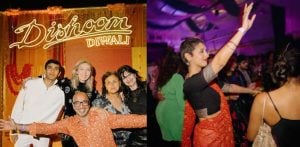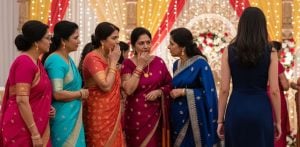"They definitely give you some wild ideas."
A new wave of “spicy” or romantasy novels is capturing the imaginations of South Asian women worldwide, reshaping their views on love, intimacy, and emotional connection.
These stories, rich in fantasy and desire, are no longer just guilty pleasures but cultural talking points that inspire conversations about empowerment, consent, and emotional honesty.
Yet, the debate remains as to whether such books foster realistic perspectives or romantic delusions.
Are they encouraging healthy exploration of intimacy or quietly distorting expectations of love?
As South Asian readers increasingly embrace these narratives, their impact reaches beyond fiction, influencing how many women approach relationships in real life.
For some, the allure lies in unapologetically sensual storytelling that places female pleasure and agency front and centre.
For others, the concern is that these passionate worlds can create unrealistic ideals that reality rarely matches.
Within South Asian communities, where conversations about intimacy often remain veiled in taboo, this shift is particularly striking.
The rise of romantasy marks a cultural movement that challenges shame and celebrates self-expression, but it also invites reflection on how fantasy intersects with identity and lived experience.
Empowerment and Positive Effects
 Spicy books have become more than escapism. They are tools of self-discovery and empowerment for many women.
Spicy books have become more than escapism. They are tools of self-discovery and empowerment for many women.
Readers are finding that the bold, emotionally rich characters in these novels permit them to embrace vulnerability, confidence, and open communication.
Sexologist Ariana Min from the Society of Australian Sexologists notes that such stories “foster imagination and connection,” helping couples explore physical intimacy with new curiosity and creativity.
By normalising conversations about female desire and consent, these books are dismantling long-held taboos around women’s pleasure.
British Asian reader Jaspreet explains: “For me, it’s not even about finding some fantasy guy, it’s more about how they dig into what women actually feel and want when it comes to intimacy.
“Like, they’re not shying away from it, are they?
“It’s made me properly think about my own relationships and what I’m getting out of them.”
Her words echo a growing sentiment among young South Asian women who see these books as spaces of emotional honesty rather than scandal.
Authors such as Ana Huang and Kennedy Ryan have also observed how the genre signals a shift in women’s storytelling, giving voice to desires often overlooked or dismissed.
Through platforms like BookTok, readers are discovering diverse characters and love stories that resonate with their own experiences.
For many Desi women, this representation fosters self-worth and sexual autonomy, proving that romance fiction can be both entertaining and transformative.
Unrealistic Fantasies and Romantic Ideals
 However, not everyone sees these stories as entirely positive.
However, not everyone sees these stories as entirely positive.
Critics argue that constant exposure to idealised passion and “perfect” lovers can warp expectations of real-world romance.
Academic research from Brigham Young University found that while fantasy romance shapes romantic ideals, most readers can still distinguish between fiction and reality.
Yet, the emotional pull of these tales can subtly influence what people believe relationships should look like: flawless chemistry, unwavering devotion, and dramatic passion.
Ayesha, a British Pakistani reader, admits that the line between fantasy and reality can blur:
“I’ll be sat there, absolutely engrossed in some millionaire bad boy drama, and then I’ll look up and remember I’m still single. They definitely give you some wild ideas.”
Despite laughing at their exaggerated tropes, she acknowledges that such stories can momentarily heighten longing or dissatisfaction with everyday relationships.
Philosopher Heidegger and other scholars warn that without media literacy or strong sex education, younger readers may misinterpret fantasy as attainable reality.
They may start believing that intimacy should always feel magical or that relationships without constant passion are failures.
This concern is particularly relevant for teenagers or inexperienced readers still forming ideas about love.
The risk lies not in the stories themselves, but in the silence surrounding real discussions about emotional health, consent, and realistic connection.
Gender and Cultural Context
 In South Asian culture, where open conversations about intimacy are often limited, spicy fiction provides a rare avenue for expression.
In South Asian culture, where open conversations about intimacy are often limited, spicy fiction provides a rare avenue for expression.
Scholars suggest that these books allow women to safely explore taboo desires without fear of judgment.
For some readers, this becomes a form of liberation, a way to reclaim sexual identity and self-awareness.
For others, it functions more as escapism, a fantasy world detached from the complexities of real relationships.
Nina, a British Punjabi reader, shares: “They’ve messed with my head, but in a good way?
“Like, before, I was cool with a quick text. Now I’m reading these books and I’m thinking, ‘Where’s my man who writes me poetry and looks at me like I’m the eighth wonder of the world?’”
Her reflection captures a common paradox: fantasy can both inspire self-worth and inflate ideals that reality struggles to meet.
For South Asian women navigating dual cultural expectations, romantasy offers something radical: permission to desire, to imagine, and to demand more.
While mainstream narratives often police women’s sexuality, these books encourage them to own it.
Yet the challenge remains in balancing fantasy’s allure with the grounding of real intimacy, where connection grows not through drama but through everyday honesty.
Ultimately, spicy books are mirrors reflecting a generation’s evolving understanding of love and selfhood.
For many South Asian women, these novels are helping redefine what it means to feel desired and to communicate openly about pleasure.
They invite empowerment through fantasy while reminding readers of the importance of discernment.
The genre’s influence depends largely on maturity, personal experience, and cultural awareness.
Readers who recognise the difference between escapism and expectation tend to extract lessons about emotional intelligence and mutual respect.
Those who take the stories too literally may risk disappointment when real partners fail to emulate fictional perfection.
Still, their growing popularity signals something powerful: women reclaiming narrative control over their desires.
Whether for empowerment, entertainment, or escapism, spicy books are sparking long-overdue discussions about intimacy, agency, and identity within the Desi community.
And in a culture still learning to talk about love openly, that alone marks quiet but meaningful progress.






























































